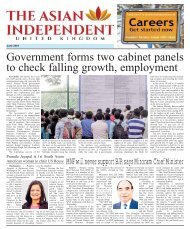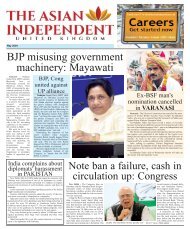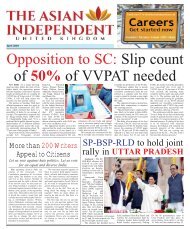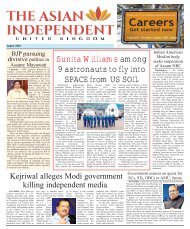December 2018
Create successful ePaper yourself
Turn your PDF publications into a flip-book with our unique Google optimized e-Paper software.
www.theasianindependent.co.uk<br />
London-Strategies that animals like lions,<br />
tigers and penguins use to find food can put their<br />
own lives in danger, a study says.<br />
According to researchers from the UK's<br />
Swansea University, animals using a high-risk<br />
strategy to find rarer food are likely to become<br />
extinct as they fail to gather food for their young<br />
ones before they starve.<br />
For example, lions and tigers have to search<br />
for long periods before they find prey, are more<br />
likely to fail to accrue the energy they need to<br />
breed, compared to animals that adopt a low-risk<br />
gambling strategy, like herbivores such as<br />
zebras.<br />
"We know that animal populations across the<br />
world are taking a hit, with the most charismatic<br />
animals like lions and cheetahs being among the<br />
worst affected, but up until now it has not been<br />
clear why," said Rory Wilson Professor from the<br />
varsity.<br />
The average time the young of each species<br />
can survive without food depends on their size<br />
(larger young ones can survive for longer) but<br />
newly hatched or newly born young of none of<br />
the species can live without food for more than a<br />
UNITED KINGDOM<br />
<strong>December</strong> <strong>2018</strong><br />
British PM May suffers three Brexit defeats in Commons<br />
London, British Prime Minister Theresa<br />
May has suffered three Brexit defeats in the<br />
Commons as she set out to sell her EU deal to<br />
sceptical MPs. Ministers have agreed to publish<br />
the government’s full legal advice on the<br />
deal after MPs found them in contempt of<br />
Parliament for issuing a summary, BBC<br />
reported on Wednesday. And MPs backed<br />
calls for the Commons to have a direct say in<br />
what happens if her deal is rejected next<br />
Tuesday. May said MPs had a duty to deliver<br />
on the 2016 Brexit vote and the deal on offer<br />
was an “honourable compromise”.<br />
The Prime Minister was addressing the<br />
Commons at the start of a five-day debate on<br />
her proposed agreement on the terms of the<br />
UK’s withdrawal and future relations with the<br />
EU. The agreement has been endorsed by EU<br />
leaders but must also be backed by the UK<br />
Parliament if it is to come into force. MPs will<br />
decide whether to reject or accept it on<br />
Continue Page 16<br />
Mentoring schemes and top scholarships...<br />
A* to C grades in GCSE maths and English, compared to all<br />
looked-after children in 2016. By establishing up to 10 of these<br />
hub areas – creating partnerships between councils, independent<br />
and boarding schools, social workers and Virtual School Heads –<br />
the government aims to replicate some of the outcomes seen in<br />
Norfolk. In these areas, more children in care will be offered<br />
places at partner independent or boarding schools, but will also<br />
benefit from meaningful opportunities and activities from these<br />
schools without attending as pupils – in recognition that boarding<br />
full time may not always be the best option for every child.<br />
In each hub, arrangements will be put in place setting out the<br />
services available to children in care, including:<br />
the academic support they will receive, with a particular focus<br />
on tutoring, mentoring or contributions towards activities in the<br />
school holidays; the activities they will benefit from that help to<br />
widen their extra-curricular skills, such as work experience opportunities,<br />
targeted help with writing UCAS statements, or debating<br />
clubs; and their access to independent schools’ sports, drama or<br />
music facilities. The plans will also provide schools with advice<br />
and guidance on how to target bursaries towards looked-after<br />
children. They will also provide options between partners for<br />
funding these places, using the Boarding Schools Partnerships<br />
model as an example, where more than 60 independent schools are<br />
already signed up to offer bursaries at reduced rates for children in<br />
care. Head of Highgate School, part of the hubs working group,<br />
Adam Pettitt, said: Too often young people find themselves shut<br />
out of the Higher Education and employment opportunities that<br />
are accessible to peers who have not experienced traumatic experiences<br />
in their young lives. Highgate’s long-standing Chrysalis<br />
Accelerator programme provides a model for other independent<br />
schools to consider when exploring ways to engage with these<br />
especially vulnerable young people.<br />
<strong>December</strong> 11. May said Brexit divisions had<br />
become “corrosive” to UK politics and the<br />
public believed the issue had “gone on long<br />
enough” and must be resolved.<br />
The Commons supported a motion<br />
demanding full disclosure of the government’s<br />
legal advice, by 311 votes to 293.<br />
The move was backed by six opposition<br />
parties, while the Democratic Unionists,<br />
which have a parliamentary pact with the<br />
Conservatives, also voted against the government.<br />
It came after Attorney General Geoffrey<br />
Cox published a summary of the advice on<br />
Monday and answered MPs questions for<br />
three hours – but said that full publication<br />
would not be in the national interest.<br />
Labour had accused ministers of “wilfully<br />
refusing to comply” with a binding Commons<br />
vote last month demanding they provided the<br />
attorney general’s full and final advice.<br />
After Labour demanded the advice should<br />
be released ahead of next Tuesday’s key vote<br />
on Mrs May’s deal, Commons Speaker John<br />
Bercow said it was “unimaginable” this<br />
would not happen. In response, Commons<br />
Leader Andrea Leadsom said she “would<br />
respond” on Wednesday but would ask the<br />
Commons Privileges Committee to consider<br />
the constitutional repercussions. An attempt<br />
by ministers to refer the whole issue, including<br />
the government’s conduct, to the committee<br />
of MPs was earlier defeated by four votes.<br />
The privileges committee will now decide<br />
which ministers should be held accountable<br />
and what sanction to apply, with options ranging<br />
from a reprimand to the more unlikely<br />
scenario of a minister being suspended from<br />
the Commons. Lib Dem leader Sir Vince<br />
Cable said the result left the government “on<br />
the ropes”, adding: “Theresa May’s majority<br />
has evaporated, and the credibility of her deal<br />
is evaporating with it.”<br />
Rail Review moves forward<br />
as call for evidence launches<br />
Independent chair Keith<br />
Williams invites evidence from<br />
a wide range of stakeholders.<br />
review now seeking views<br />
from passengers and businesses<br />
across the country<br />
evidence to inform ‘root and<br />
branch’ review which will<br />
transform rail industry<br />
ambitious reforms to help<br />
railway meet demands of 21st<br />
century<br />
The sweeping review of the<br />
rail industry, announced by the<br />
Transport Secretary in<br />
September, has moved significantly<br />
forward with the launch<br />
of the call for evidence today (6<br />
<strong>December</strong> <strong>2018</strong>).<br />
Keith Williams, independent<br />
chair of the Rail Review and<br />
former British Airways chief<br />
executive, is inviting evidence<br />
from a wide range of stakeholders<br />
in all parts of the country,<br />
including passenger representatives,<br />
businesses, leading<br />
thinkers and investors, and<br />
local and devolved bodies and<br />
governments. He is travelling<br />
across the country visiting<br />
cities, towns and regions that<br />
depend on rail connections, listening<br />
and gathering information<br />
that will help inform a<br />
transformation of the rail<br />
Why animals with high-risk strategies are likely to be extinct<br />
3<br />
industry to benefit passengers<br />
and support a stronger, fairer<br />
economy.<br />
Keith Williams said:<br />
Creating a railway for the<br />
21st Century passenger is at the<br />
core of this review. We’re<br />
launching a call for evidence<br />
and want to hear from passengers,<br />
the industry, leading<br />
thinkers and investors – and<br />
also the cities, towns and<br />
regions who depend on their<br />
rail connections.<br />
Next year, after forensic<br />
investigations and conversations<br />
with people across the<br />
country, we will deliver a white<br />
paper with ambitious proposals<br />
for change. The review will<br />
consider ambitious recommendations<br />
for rail reform, building<br />
on the government’s franchising<br />
strategy and bringing track<br />
and train closer together to<br />
reduce disruption and improve<br />
accountability. It will also consider<br />
regional partnerships and<br />
how we can use innovation to<br />
improve services and value for<br />
money for passengers.<br />
The government will publish<br />
a white paper on the review’s<br />
recommendations, with the<br />
implementation of reforms<br />
planned to start from 2020.<br />
few days, the researchers explained.<br />
For the study, published in the journal Current<br />
Biology, the team used animal-attached thumbnail-sized<br />
electronic tags record the movement<br />
and measure food consumption in condors, cheetahs,<br />
penguins and sheep in Argentina, South<br />
Africa and Northern Ireland over a six-year period<br />
While the Magellanic penguins from<br />
Argentina finds fish easily, indicating that the<br />
odds are good for them, the African penguins,<br />
whose population has been declining in southern<br />
Africa for decades, have very poor odds for their<br />
food-finding stakes due to commercial fishing<br />
practices.<br />
"When animals are taking rare prey anyway,<br />
even small changes in the ecosystem stemming<br />
from human activities can be the straw that<br />
breaks the camel's back in terms of breeding success,<br />
and this seems to be the case for the African<br />
penguin, whose population is now just one per<br />
cent of what it was 100 years ago," Wilson said.<br />
The researchers hope that their model can be<br />
used to predict the fortunes of species across the<br />
globe, which could prove pivotal in helping to<br />
formulate conservation plans.
















